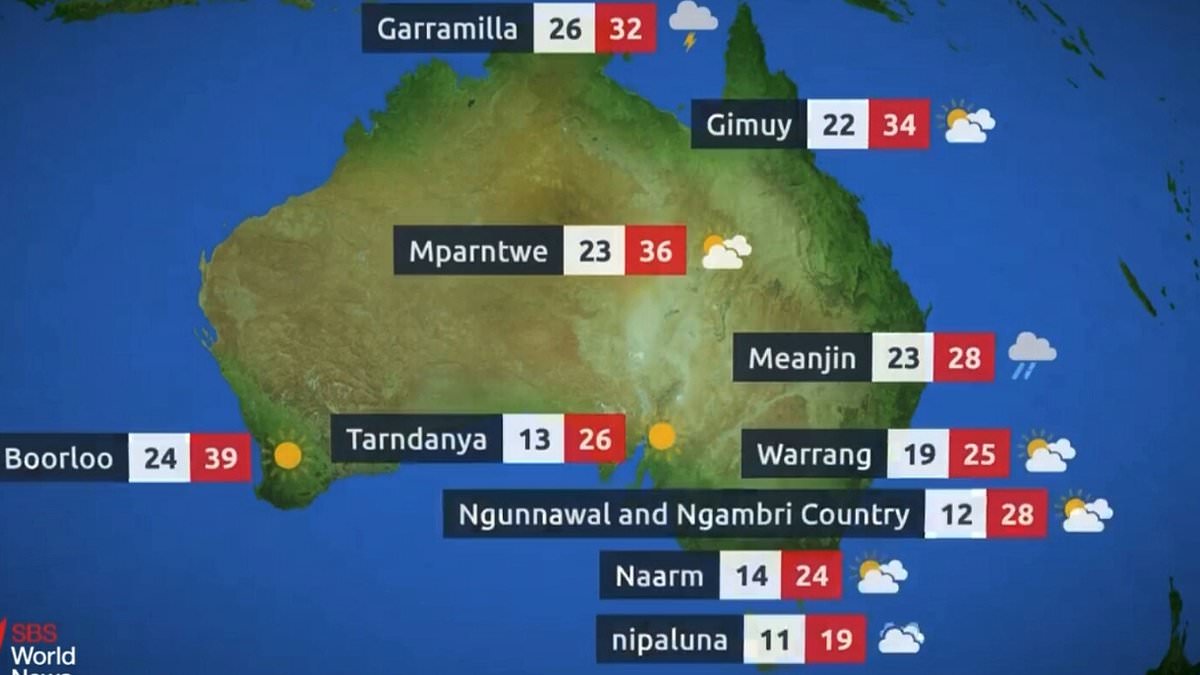A major TV network’s practice of displaying a weather map with Indigenous names for cities has sparked a heated debate.
On SBS’s flagship World News Bulletin, the n weather map is shown first with the English names for each capital before flipping over to Indigenous titles.
Sydney becomes Warrang, Brisbane is known as Meanjin, Melbourne is Naarm, Adelaide is Tarndanya and Perth is Boorloo.
Perplexed 2GB listener Peter rang Ben Fordham’s show on Wednesday morning to complain that the Indigenous names would not mean anything to the vast majority of viewers.
Indigenous leader Warren Mundine told Fordham that although displaying Aboriginal place names is a ‘nice idea’, it starts ‘getting a bit crazy and going overboard, and that’s when it upsets people’.
Mr Mundine admitted that when airports show Indigenous names for n cities on departure boards he doesn’t know which place they refer to.
‘I was standing there trying to catch a plane and didn’t know where I was going,’ he said.
‘Where’s that place? If you’re flying from A to B put from A to B.’
Some n airports alternate between showing English and Indigenous names for departures and arrivals.
Those responding to the radio segment on the station’s Instagram page were strongly polarised over the use of Indigenous names.
‘Token silliness,’ one personal called it.
‘What are they trying to prove by shoving that down our throat? Virtue signalling at its finest,’ wrote another commenter.
‘Imagine the poor international tourists,’ another person wrote.
However, there were a number who liked the idea.
‘I love this… the languages of the lands are so diverse,’ one person wrote.
‘It’s pretty cool, Educational too. I like it,’ said another.
Some fired back at those unhappy with the retitled maps.
‘It seems the only ones that are mad and complaining are those that listen to 2GB and watch Sky News,’ one person wrote.
‘So yeah, conservatives are the only ones triggered.’
SBS has been displaying Indigenous names for n capitals since February, 2023.
In introducing the move the publicly funded broadcaster said it was to reflect ‘Traditional Custodianship and more than 60,000 years of history’.
In introducing the practice SBS Elder-in-Residence and Widjabul Wia-bal woman Rhoda Roberts AO said the ‘revitalisation of First Nations’ languages heals our nation’.
‘For me, it’s a time of a new awakening that informs us all,’ she said.
‘Behind every word you will find information about the seasons, the place and the ecology of our wonderful country. It’s more than education – it’s also the science and the realisation that words can enlighten us all.’
SBS Director of News and Current Affairs Mandi Wicks said at the time that the network ‘was proud to be taking this important step in First Nations representation in n media’.
‘The power of language to foster inclusion can’t be understated, and this initiative will further share First Nations languages and cultures with all ns,’ she said.
